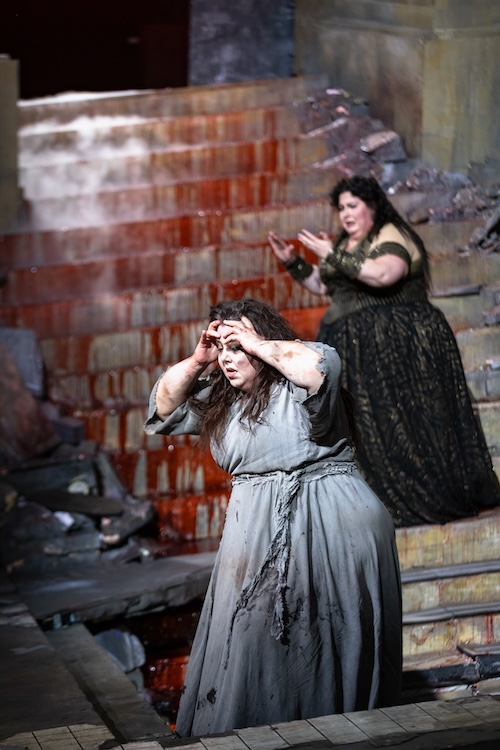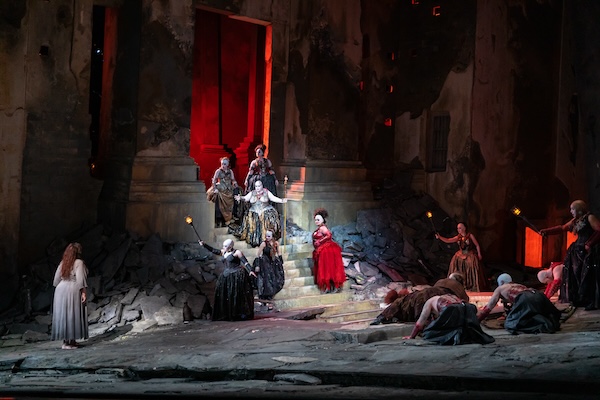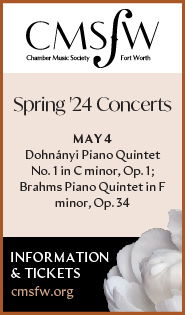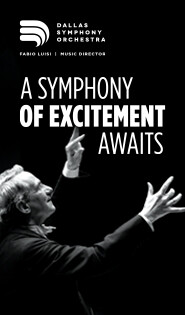Dallas Opera unleashes a stunning night of musical mayhem with Strauss’s “Elektra”

Dallas Opera’s production of Richard Strauss’s expressionist masterpiece Elektra opened Friday night at the Winspear Opera House and the performance was stunning in every respect.
The first of the composer’s ten fruitful collaborations with librettist Hugo von Hofmannsthal, Strauss’s opera is based on the bloody tragedy by Sophocles.
The production was originally created for the Lyric Opera of Chicago and directed here by Nick Sandys, whose use of space in both ensembles and solo scenes was potent, with frequent touches of bitter irony. John Macfarlane’s perilously leaning set depicted a dilapidated palace with precarious steps leading up to an angled palace gate. Harsh greys and beiges predominated, while his gloomy but subtly varied costumes accented the drama.
Lighting designs by Jennifer Tipton featured subdued yellows or reds emanating through the large gate and across the otherwise sparsely lit somber sets. The climactic vengeance murder spree occurred largely offstage.
Making her Dallas debut in the title role was Baylor University alum Marjorie Owens. Her rich tone is especially well suited to this late Romantic role, and the soprano proved an impassioned anti-heroine, displaying a wide spectrum of vocal dynamics and expression. Her raw depiction of the distraught vengeful Greek princess was intense and powerful.
The strongest voice among the cast came from Angela Meade, who brought her robust soprano to the role of Elektra’s dubious sister Chrysothemis.
The several duets for Owens and Meade were sensitively sung, their voices well matched. When Elektra cajoles Chrysothemis to join the revenge plot, Strauss employs the sweetest love-duet style, in which both sopranos were radiant. The sisters’ soaring victory duet after their father’s murder is avenged was a highlight.
Mezzo-soprano Jill Grove as Klytämnestra, the queen and main villainess, was athletic yet eloquent. Her grotesque bejeweled costume with its exaggerated waist, her bald head and faux exposed chest, made for the most disquieting appearance of the evening. The pathetic mother-daughter duet by Grove and Owens was punctuated by shimmering strings and muted trumpets with horns and tuba.

Men’s voices do not appear in the opera until the halfway point. Bass-baritone Alfred Walker as Orest sang with full-bodied luster. The creamy tenor of Clifton Forbis as Aegisth appeared all too briefly in the final minutes.
Strauss’s darkest dissonances were unleashed in the most violently emotional moments, juxtaposed with sublime music, as when Orest reveals himself to Elektra. Here, Walker’s artfully balanced reunion duet with Owens was accompanied by beautifully intricate orchestration, emphasizing the oboes, flutes, and violins.
Klytämnestra’s spectacular retinue, either bald or sporting spiky Mohawks, slithered up and down stairs and around the set. Their pale ghostly makeup and wigs were David Zimmerman’s most effective contributions.
Conductor Emmanuel Villaume had the enormous orchestra of ninety-eight players largely under control, only briefly overpowering the female leads. Nobody orchestrates better than Strauss, and the marvelous range of instrumental colors was extraordinary. Lush passages of eight clarinets with four bassoons alternated with tastefully punchy brass. The horns—half of whom doubled on Wagner tubas—nostalgically painted the simple virtuous life that Chrysothemis longed for. The dense strings are sometimes divided into thirteen sections, with the violas especially strident. The reinforced percussion section thundered and sparkled.
Compelling singing, and acting, together with cogent staging, succeeded in bringing the ancient violent tragedy to life and offered a jarring but hugely enjoyable theatrical experience.
Elektra runs through February 17. dallasopera.org


